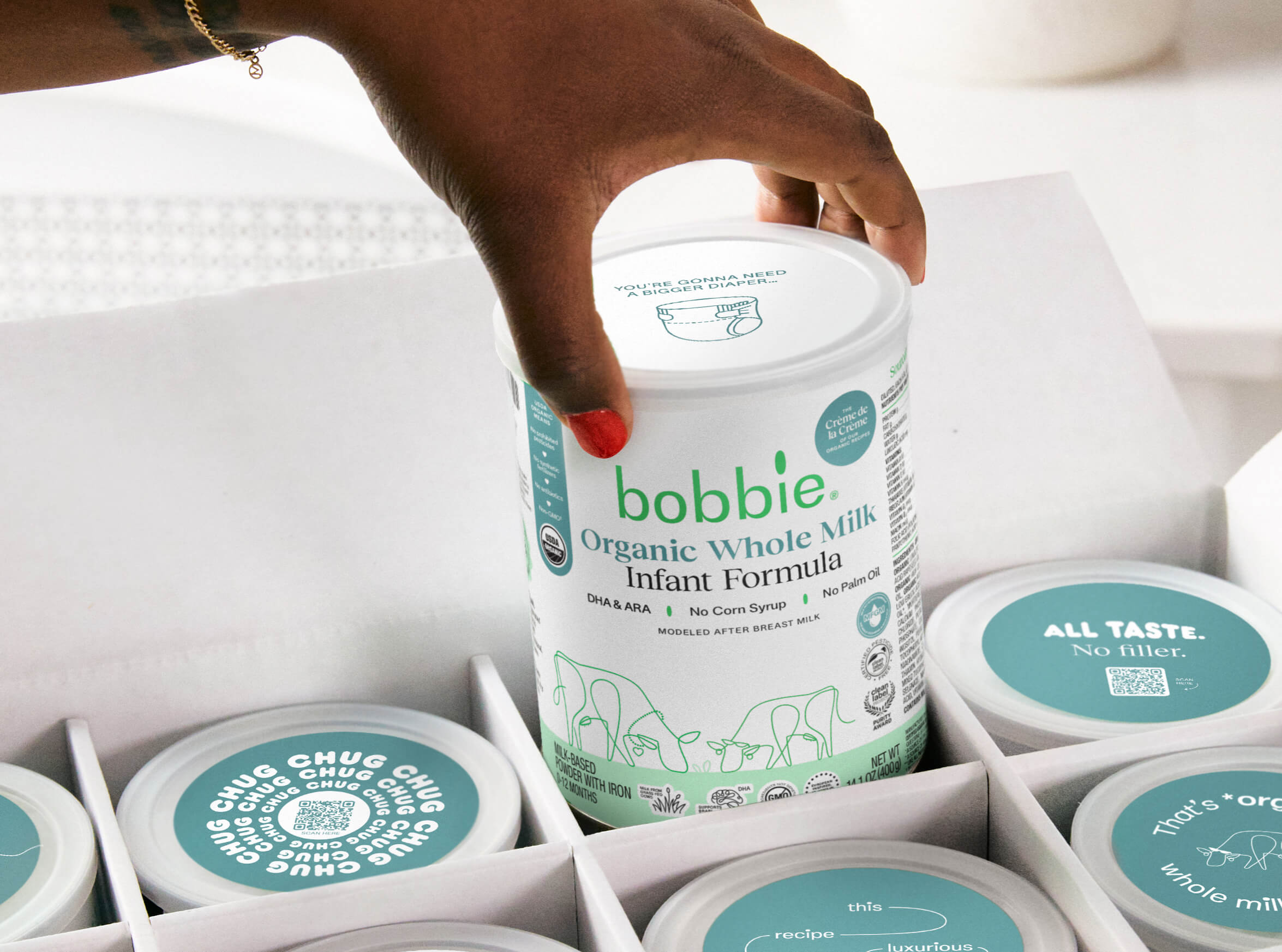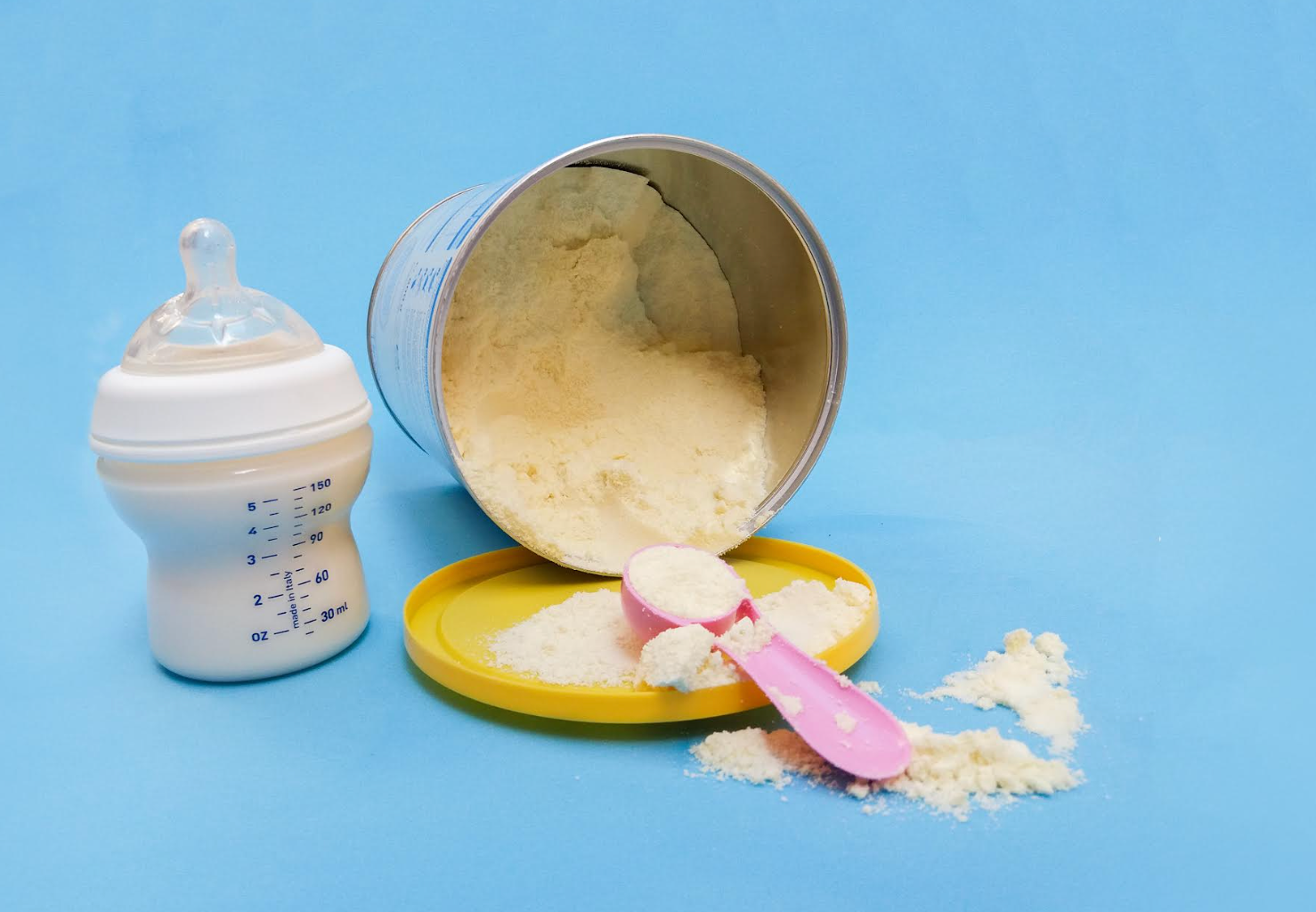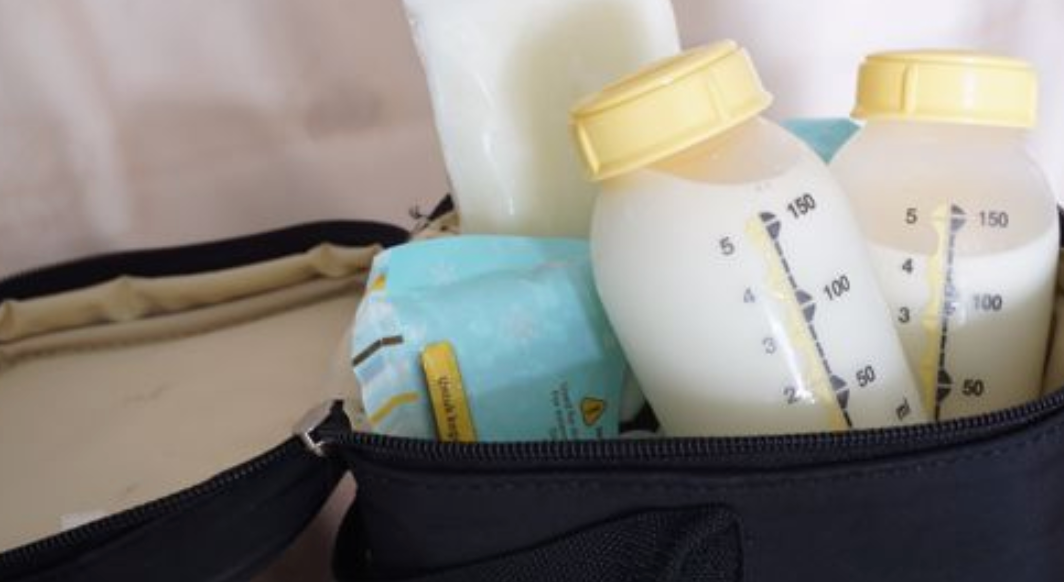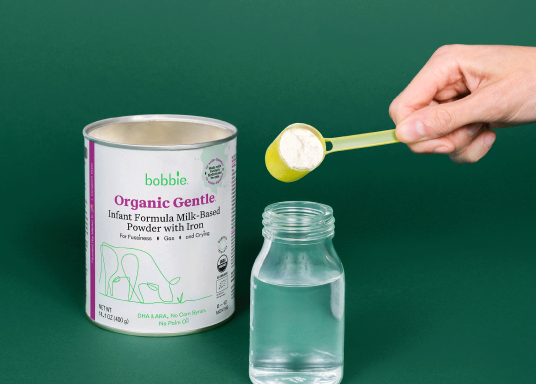Published November 18, 2024

Types of Infant Formula & How to Choose One
Choosing the right infant formula is a big decision – with parents weighing options among formulas like ingredients, availability, cost, personal preference, and healthcare professional recommendation. Infant formula provides essential nutrition to help your little one thrive, whether it’s their primary source of nourishment or a supplement to breastfeeding. With so many options on the market, from traditional cow’s milk formulas to those designed for sensitive tummies or special dietary needs, understanding what’s available and what best suits your baby can feel overwhelming.
In this guide, you’ll learn about the different types of infant formulas, who they’re best suited for and how to pick the right one for your baby’s unique needs. Consider this your quick-start guide to infant formula, helping you make an informed choice to support your child’s health and happiness.
What Is Infant Formula?
Infant formula is a specially designed food formulated to provide the essential nutrition infants need, modeled after the composition of breast milk. As a primary or supplementary source of nourishment, infant formula is created to support normal physical growth, brain development, immune system health, and digestive health. This nutritional support is especially important when breastfeeding is not an option or if families choose to supplement with formula feeding.
What makes up baby formula? Generally, baby formula is made from a blend of proteins, carbohydrates, fats, vitamins, and minerals. Key ingredients, such as iron, sources of fatty acids, and lactose serve specific developmental needs:
- Proteins: Protein is essential for tissue growth and repair. In infant formula, proteins are derived from cow’s milk, goat’s milk, free amino acids, or soybeans to aid in growth.
- Carbohydrates: Carbohydrates offer a source of energy. They may come from lactose, which is a naturally occurring carbohydrate found in cow's milk and breast milk, or from non-lactose sources like maltodextrin, corn syrup solids, or sucrose (table sugar).
- Fats: Fats support brain development and energy needs. High-quality plant-based oils are commonly used to provide necessary fatty acids, although some formulas now also include fats from whole milk.
- Vitamins and Minerals: To help babies reach developmental milestones, infant formulas are fortified with vitamins and minerals. This includes nutrients like iron and vitamin D.
- Other Ingredients: Fatty acids (such as DHA) to support brain and eye development, and in some cases, prebiotics or probiotics to support gut health.
A Guide To Infant Formulas: Forms and Types To Explore
Commercial infant formula comes in a few different forms, allowing parents to choose one that best aligns with their lifestyle and feeding routine.
- Powdered Infant Formula: The most cost-effective option, powdered formula requires mixing with water. It’s convenient for storage and travel but needs precise measuring.
- Concentrated Liquid Infant Formula: A middle-ground option, concentrated liquid formula may be more convenient than powdered infant formula. It still requires dilution but involves less mixing. Any unused liquid concentrate formula needs to be stored in the fridge, however, and used within the time frame indicated on the can–typically 48 hours.
- Ready-to-Use Infant Formula: This is the easiest to prepare as it requires no mixing. It’s also often more expensive, but its convenience makes it helpful for parents on the move.

Shop Bobbie Baby Formula
Bobbie infant formulas are clean, EU-style infant formulas that meets all FDA requirements. They are complete nutrition, milk-based powder, modeled after breast milk and is easy on tummies. They are all non-GMO and do not have corn syrup, palm oil, or maltodextrin. Shop Bobbie today!

Each form has pros and cons, and parents can choose one that best suits their daily needs. Beyond forms, there are different types of formulas designed for various dietary needs:
- Cow’s Milk-Based Infant Formula: The most common choice, cow’s milk-based infant formulas are well-suited for most babies unless they show sensitivity to lactose or cow’s milk proteins.
- Soy-Based Infant Formula: Soy-based infant formulas offer a plant-based protein source, making them a possible option for infants who have not tolerated cow milk formulas, have congenital lactose intolerance, or for families following a vegan diet.
- Extensively hydrolyzed Infant Formula: Formulated for babies with milk protein allergies, protein hydrolysate formulas extensively break down proteins into smaller pieces, making them easier to digest and less likely to trigger allergic reactions. Extensively hydrolyzed formulas may also be referred to as hypoallergenic infant formulas.
For babies with specific health concerns, specialized formulas are available:
- Lactose-Free Infant Formula: Suitable for infants who cannot tolerate lactose.
- Premature Infant Formula: Made with higher calorie and nutrient concentrations to support the rapid growth needs of premature babies.
- Anti-Reflux Infant Formula: Thickened formulas designed to help reduce spit-up and discomfort for babies with reflux issues.
- Metabolic Infant Formulas: Specially designed formulas to support nutrition for infants with inherited metabolic disorders.
Factors To Consider When Choosing an Infant Formula
With so many options, how do you determine the best infant formula for your baby? Here are some key factors to consider as you make your choice:
- Dietary Restrictions and Health Concerns: Babies with allergies or intolerances may require a specialized infant formula to prevent digestive issues.
- Ingredient Sensitivities: Some infants may have sensitivity to specific ingredients, such as soy or corn, which are found in some formulas.
- Lifestyle Preferences: For families following vegan or vegetarian diets, soy-based infant formulas offer a viable option.
- Quality Preferences: Families may prefer formulas that are certified USDA organic or formulas that have earned the Clean Label Project’s Purity Award.
- Availability and Affordability: Ensure that the formula you choose is easily accessible and fits within your budget. Powdered infant formulas tend to be the most economical, while ready-to-use options are pricier. And with Bobbie infant formulas, you have the option of subscribing to receive your formula delivered monthly. Subscribers receive 10% off and free shipping on their recurring monthly orders, as well as guaranteed formula and inflation-proof pricing for your baby’s entire feeding journey. Subscribe to Bobbie today!
- Pediatrician Recommendations: Consulting with your pediatrician is invaluable, especially if your baby has unique dietary needs or health considerations. Always use infant formula as directed by a healthcare professional.
Sign up to get the scoop on feeding, sleep, poop, and so much more. By singing up for email, you are to receive marketing emails from Bobbie and can manage your email preferences or unsubscribe at anytime

Your go-to resource for all things new baby.
Tips for Transitioning Between Formulas
When it’s time to introduce a new infant formula, a smooth transition is key to helping your baby adjust to the new taste and ingredients. Whether the change is prompted by allergies, evolving dietary needs or lifestyle choices, following a few simple steps can make the switch easier on both you and your baby.
Consider these tips for a successful transition:
- Consult Your Pediatrician First: Before making any changes to your baby’s diet, it’s important to check with your pediatrician. They can help you determine the best formula option and offer guidance specific to your baby’s needs.
- Make the Switch Gradually: A gradual approach can work for some babies. Start by preparing each bottle of infant formula separately according to the preparation instructions and offer them each (separately) during feedings.
- Or Switch Cold Turkey: Some babies also do just fine switching from one infant formula to another right away! Parents may have to make a sudden change due to symptoms of allergies. Check with your child’s healthcare professional to determine whether you should switch gradually or right away.
- Watch for Signs of Discomfort: As you introduce the new infant formula, keep in mind that changes in digestion such as fussiness, loose or firmer stool, or increased gas are common during the transition period. While these symptoms can be normal, keep a close eye on your baby for any signs of intolerance. These can be indicators that the formula doesn't agree with them. Noticing these changes early on allows you to make adjustments as needed.
- Stay Consistent with Feeding Times: Maintaining regular feeding times can add a layer of comfort during the transition. A familiar routine provides stability, helping your baby feel more at ease with the dietary change.
- Give It Time: Patience is definitely a virtue here, as some clinicians suggest that most babies typically need a few days to a week to fully adapt to a new formula. During this period, they may experience mild adjustments in digestion as they acclimate to the new ingredients. Check with your child’s healthcare professional to determine the transition period right for your baby.
- Track Your Baby’s Reactions: Throughout the transition, keeping a journal of any noticeable reactions, like changes in mood, sleep or digestion, can help you track progress and spot any patterns. If you observe any persistent negative symptoms or suspect a formula intolerance, reach out to your pediatrician for support.
Organic Options for Your Baby’s Health and Development
Choosing an organic infant formula is a thoughtful choice for parents who prioritize organic ingredients for their baby’s health and wellness. Organic infant formulas contain organic ingredients that meet organic farming standards. This means that ingredients used avoid the use of synthetic fertilizers and pesticides, and genetic engineering. Some offer additional certifications like the Clean Label Project Purity Award or the Non-GMO Project Verified seal.
Bobbie is a trusted brand offering 2 different types of organic infant formula dedicated to supporting the health and development of babies. Choosing a Bobbie infant formula can give parents peace of mind that they’re providing their baby with a high-quality product, made with the essential nutrients needed to thrive.
Choosing the right infant formula is a big decision, and your pediatrician is always there to help with guidance and advice that’s just right for your little one. Giving your baby the best start with an infant formula that supports their growth and well-being lays an amazing foundation for their lifelong health and happiness.
Ready to try a formula crafted with care? Explore Bobbie’s infant formula offerings. With Bobbie, you can feel confident knowing you're giving your baby top-quality nutrition that supports their unique needs – making every choice feel just right!
Bobbie infant formulas are clean, EU-style infant formulas that meets all FDA requirements. They are complete nutrition, milk-based powder, modeled after breast milk and is easy on tummies. They are all non-GMO and do not have corn syrup, palm oil, or maltodextrin. Shop Bobbie today!
Shop Bobbie Baby Formula

The content on this site is for informational purposes only and not intended to be a substitute for professional medical advice, diagnosis or treatment. Discuss any health or feeding concerns with your infant’s pediatrician. Never disregard professional medical advice or delay it based on the content on this page.




































